[Cross-posted from Where the Blog has No Name]

University of Louisville president James Ramsey posed for photo in sombrero, poncho at the his 2015 Halloween party
In the late 1990s, Kentucky’s legislature initiated a program to upgrade and reform the state’s postsecondary education system, it was called “Bucks for Brains.” (The state’s promotional tagline at the time was “Open for Business.”)
I was recruited to the University of Louisville in 2001 and spent two-and-a-half years on the faculty there as a department chair and distinguished university scholar, which gave me an up close and personal experience with a university administration that’s, as they say where my family’s from, sigogglin.
John W. Shumaker, a classics scholar, was UofL president when I arrived and he proved to be an incredible fund raiser, increasing the university’s endowment from under $200 million to $550 million.
Of course, the UofL has long been the recipient of corporate largesse, especially from the Louisville’s corporate giants Brown-Forman (one of America’s largest spirits and wine companies); Brown & Williamson (which chemically enhanced the addictiveness of cigarettes, remember whistleblower Jeffrey Wigand? No? Well I’m sure you remember Russell Crowe playing Wigand the blockbuster movie The Insider); Papa John’s Pizza (UofL football Cardinals play in Papa John’s Cardinal Stadium); and Yum! Brands (“feeding the world” crap food via KFC, Pizza Hut, and, of course, Taco Bell, more on the Mexican connection later).
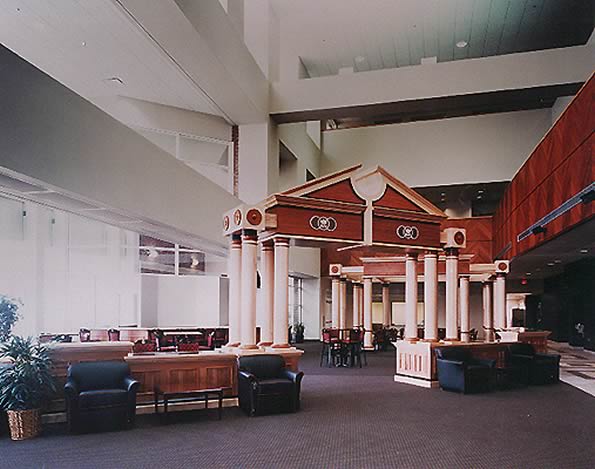
The Brown & Williamson Club at the University of Louisville’s Papa John’s Cardinal Stadium
After Shumaker left to head up the University of Tennessee (where he resigned in disgrace after 3 years), he was replaced by James R. Ramsey, who had been Kentucky’s state budget director under Gov. Paul E. Patton (who became wealthy by exploiting Kentucky’s coal miners).
Patton’s major achievement as governor was overhauling postsecondary education in the Kentucky. But Patton’s political career was de-railed by duelling scandals: (1) an extramarital affair and a sex-for-favors scandal; and (2) pardoning four of his political advisers who were indicted for violating Kentucky’s campaign finance laws and for allegedly abusing his patronage powers.
All of this is just everyday Kentucky politics, so Patton wasn’t distracted enough to forget he had to find a soft-landing for his budget director, thus Ramsey, with no university administration experience, became the 17th president of the University of Louisville.
Since Ramsey has been in office the UofL, in endowment has continued to grow and is now pushing the $1 billion mark, which is really the only logical explanation for why he hasn’t been bounced because Ramsey’s administration has more ethical lapses than Carter has liver pills, pretty much proving that the UofL has more bucks than brains.
Robert Felner: Former Dean, Convicted Felon
Felner arrived in Louisville with some spiffy credentials: PhD in psychology from Yale; former head of the department of psychology at the University of Illinois; a CV packed with pages upon pages listing his publications in top journals and, most importantly for the UofL administration, a staggering number of grants.
Despite several red flags about Felner’s candidacy for dean of UofL’s College of Education and Human Development, Ramsey and his long time provost, Shirley Willihnganz, couldn’t wait to get Felner on campus.
Ramsey was in such as rush to land Felner he and Willihnganz forgot to tell the interim dean (and other finalist for the position) they hired Felner, so he was left to discover the decision when Felner call his secretary and started giving her instructions. So much for that HR seminar!
Things in CEHD soon started to fall apart.
I resigned from my department chair position two weeks after Felner took over as dean and later moved to UBC.
Within a few years, there had been 30 grievances filed by faculty and students against Felner for a wide range of abusive managerial practices and a faculty vote of no-confidence in Felner’s leadership of the CEHD. Reasons given by faculty for the vote of non-confidence included:
Public humiliation of faculty, work place harassment, retaliation for voicing opinions, little or no governance, decisions that hurt College, unacceptable and unfair hiring practice; rude, offensive, unethical behavior by CEHD representatives; denial of support for research to those who differ in opinion; and extreme inequity of pay. (See CEHD meeting notes published here.)
Despite the abominable conditions in CEHD, UofL Provost Willihnganz and Ramsey both supported Felner publicly.
One year after the vote of no-confidence, Felner announced he was leaving the UofL to become president of the University of Wisconsin, Parkside.
The Chronicle of Higher Education described Felner as “riding high” a couple of years into his deanship at UofL, well-paid, and having secured a $700,000 grant from the US Department of Education. However, he “pressed his luck” during his last weeks in Louisville.
Even though only $96,000 remained in the account, he implored Louisville officials to approve a $200,000 subcontract with a nonprofit organization in Illinois that had already received $450,000 from the grant. Perhaps, he suggested, the university could draw on a special fund that had been established by the daughter of a former trustee.
The Illinois group, Mr. Felner said, had been surveying students and teachers in Kentucky. That survey would “let us give the feds something that should make them very happy about the efficiency and joint commitment of the university to doing a good job with an earmark, as I know we will want more from this agency,” he wrote in an e-mail message on June 18.
But on June 20, his last day as Dean of CEHD before he headed off to Wisconsin, those big black SUVs with government plates (like the ones you see on Criminal Minds) rolled into the CEHD parking lot. US Secret Service, US Postal Inspectors, and UofL Police questioned Felner and escorted him off campus, along with his computers and records.
There was a simultaneous raid on UW-Parkside to confiscate material Felner had shipped ahead of his arrival there.
In October 2008, a federal grand jury indicted Felner on nine counts of mail fraud, money laundering, and tax evasion. According to the indictment,
the Illinois nonprofit group, known as the National Center on Public Education and Prevention, was simply a shell that funneled money into the personal bank accounts of Mr. Felner and Thomas Schroeder, a former student of his and the group’s “executive director.” Prosecutors say the two men siphoned away not only the $694,000 earmarked grant, but also $1.7-million in payments from three urban school districts, money that ought to have gone to the legitimate public-education center that Mr. Felner had created in Rhode Island.
In January 2010, Felner pleaded guilty to nine Federal charges, including income tax evasion.
In May 2010, Felner was sentenced to 63 months in US Federal Prison for his role in defrauding defrauding the UofL and the University of Rhode Island, where he had been director of the School of Education, of $2.3 million of US Department of Education funds earmarked for No Child Left Behind Act research.
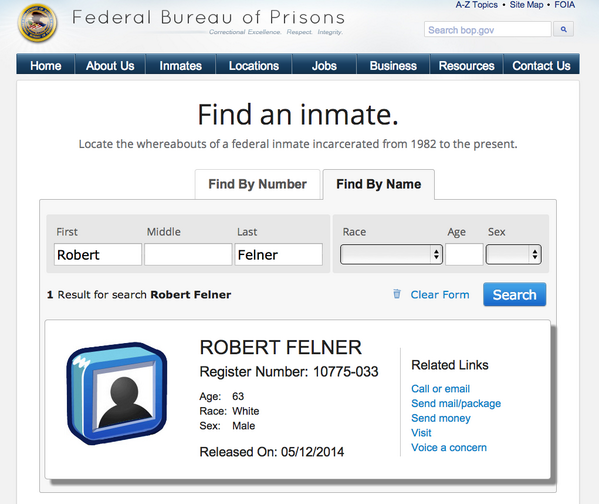
10775-033 aka Robert Felner was released from US Prison in May 2014
For a a short course on the felonious Felner see the PageOneKentucky.com summary of events. For a full course on the Felonious Felner and the incompetence and ethical lapses of Ramsey’s UofL administration click here. (Shout out to Jake at PageOneKentucky for excellent investigative reporting on Felner and the UofL.)
For Workplace Blog coverage of Felner click here.
And here is a Louisville Courier-Journal profile of Felner that pretty much sums up the guy that Ramsey defended until he pleaded guilty: Robert Felner profile: Arrogant, outrageous, abusive and duplicitous.
Felner Footnotes: Indians, John Deasy, Non-Disclosure Agreements & Ramsey as the Frito Bandito
(1) When Felner announced his resignation, UofL president Ramsey wroted to Felner and said he was worried about “letting the Indians get back in control of the reservation.” That’s some serious respect for university faculty and the idea of shared governance, eh?
(2) Los Angeles school superintendent, John Deasy, has had his academic credentials called into question. Deasy was given a PhD by the University of Louisville after he was enrolled for four months and received a total of nine credits.
Deasy’s doctoral advisor was, surprise, Robert Felner! Deasy had previously awarded $375,000 in consulting contracts to Felner, while Deasy was Superintendent of Santa Monica schools.
Ramsey appointed a “blue-ribbon” panel to investigate Deasy’s degree. The panel found that getting a PhD in four months at the UofL was not cause for concern, thus plunging the UofL’s academic reputation down into the neighbourhood of fly-by-night for-profit “higher” education.
Deasy is now working in an unaccredited training program sponsored by educational de-formers the Broad Foundation, which teaches school leaders business methods and supports charter schools and closing public schools.
(3) Ramsey has been making double retirement payouts to UofL administrators for their silence.
Records show that the school paid a full year’s salary to outgoing vice presidents Michael Curtin ($252,350) and Larry Owsley ($248,255) and to assistant to the president Vivian Hibbs ($66,391) to induce them not to “disparage, demean or impugn the university or its senior leadership.”
In March 2014, UofL made a $346,000.00 settlement with university counsel Angela Kosawha:
The University of Louisville is paying another large settlement in connection with the retirement of a high-ranking official — this time, $346,844 to its top lawyer. University counsel Angela Koshewa is on a three-month leave of absence before she officially retires June 1. Documents obtained under the Kentucky Open Records Act show the university is paying Koshewa — who has questioned some expenditures and proposals backed by President James Ramsey and Dr. David Dunn, the executive vice president for Health Affairs — twice her final salary.
It costs a lot for Ramsey to cover up details of his administration’s incompetence and shenanigans, but remember there are lots of bucks at UofL.
(4) Provost Shirley Willihnganz stepped down as UofL provost earlier this year. The Louisville Courier-Journal reported that
Under her watch, however, university employees have stole, misspent or mishandled at least $7.6 million in schemes at the health science campus, the law school, the business school and the athletic department’s ticket office.
Willihnganz also was criticized for approving about $1 million in buyouts for former high-ranking employees, some of which included agreements not to disparage the university or its leaders.
She also was forced to apologize to CEHD faculty in 2008 for failing to take any common-sense action against Felner for his intimidation, harassment, humiliation and retaliation against faculty, staff, students and alumni.
Willihnganz said at the time that she tended to dismiss the early complaints against Felner — including a no-confidence vote by faculty — because he was a “high performer” and because the complaints came from professors and staff “entrenched in their ways and resistant to change.”
She later told faculty at a meeting that she was sorry. “Mostly what I think I want to say is people have been hurt and something very bad happened, and as provost I feel like I am ultimately responsible for that,” she said.
No duh! She actually is directly responsible for the Felner disaster (along with Ramsey), that’s probably why she feels that way. And speaking of resistance to change …
(5) This next item has nothing to do with Felner, except that his former boss and advocate, James Ramsey, is also the long time boss of UofL basketball coach Rick Pitino who admitted to having sex with a women in a swanky Italian restaurant in Louisville. Apparently that’s not a problem with Ramsey and the UofL because Pitino said it wasn’t rape.
And, now Pitino is using hookers and strippers to recruit high school basketball players to come to the UofL. See Dave Zirin’s pieces on the latest Ramsey supervised scandal:
(6) And I almost forgot. Remember the Taco Bell/Mexican connection. This week Ramsey had a little halloween party at the UofL. Ramsey goes racist (again). Yes, he dressed up like the Frito Bandito.
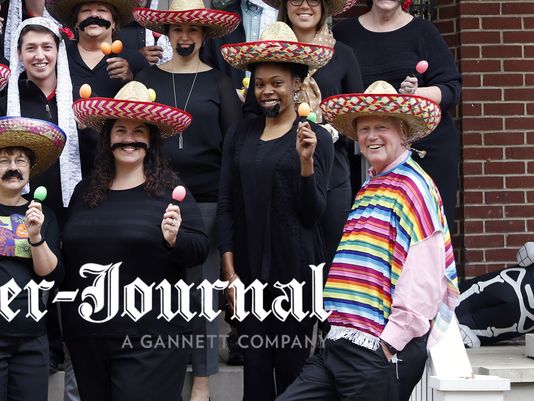
UofL President James Ramsey says “Yo quiero Taco Bell.”
And you thought the HR training at UofL was bad, get that guy to the diversity office and cross your fingers that they’re better than the university’s accounting folks.



 Follow
Follow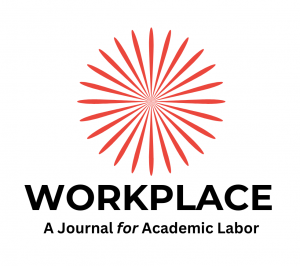

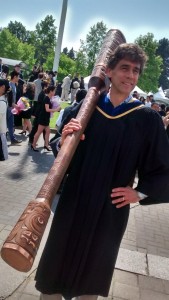





Peter Wylie: My Faculty Association and Me: A Case Study in Sweetheart Unionism and Academic Mobbing
My Faculty Association and Me: A Case Study in Sweetheart Unionism and Academic Mobbing
By Peter Wylie
This paper recounts recent experiences of mine with the University of British Columbia (UBC) Faculty Association (UBCFA). I am a tenured Associate Professor at UBC, Okanagan campus (UBCO) and I began my FA role as 1st Vice-Chair of the Okanagan Faculty Committee (OFC), an executive position on this standing committee of the FA, in July 2017. The paper is couched in terms of the relatively recent concept of academic mobbing, defined as “an insidious, non-violent and sophisticated kind of psychological bullying that predominantly takes place in college and university campuses.”1 It also employs the concept of “sweetheart unionism” defined as a deal between an employer and union officials that benefits both at the expense of employees; in this case, a deal between UBCO and UBCFA that benefits UBCO management and FA Executive Director and staff in Vancouver at the expense of UBCO faculty members.
My Faculty Association and Me A case Study in Sweetheart Unionism and Academic Mobbing.pdf
Comments Off on Peter Wylie: My Faculty Association and Me: A Case Study in Sweetheart Unionism and Academic Mobbing
Posted in Academic Labor, Bullying & Mobbing, Commentary, Corporate University, Faculty, Free speech, Solidarity, Unions
Tagged bullying, Corporate Univeristy, Free speech, mobbing, UBC, UBCFA, unionism, Unions, University of British Columbia